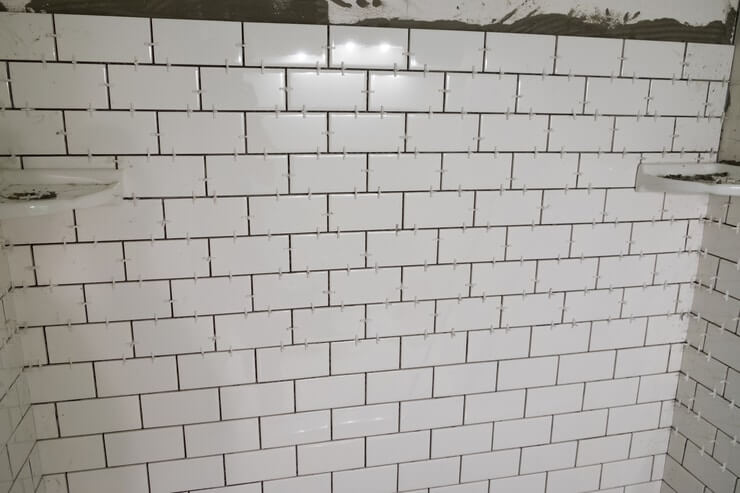Tiles are a creative and effective way to protect your bathroom while retaining a stylish look. But when it comes to installing tiles, grout is a vital part of the process.
Grout not only helps strengthen tile but keeps the gaps between tiles waterproof and prevents debris from getting underneath your tile. But if you do not let your tile set before grouting, you can be left with a minor disaster to deal with.
This article will answer all the common questions regarding how long you need to wait before grouting, can you walk on tile before grouting, along with other relevant information.
Let’s get started.

What Happens if You Grout Tile Too Soon
If you grout your tile before it can set, you will undermine the integrity of your original tile installation. Grouting too early can cause the tile to become loose and fall off your floor or wall.
By becoming loose, your tiles cannot adequately defend against water leading to water seeping behind your tiles damaging your floor or walls, and bringing about mold.
Can You Walk On Tile Before Grouting
You can walk on your tile before grouting if you take extra care, but it is not recommended in most cases. Without the grout to strengthen your tile, they can crack under your weight.
Also, if your tile has not fully set or adhered to your floor, you can loosen your tiles or bring them out of alignment.
How Long Does Tile Need to Set Before Grouting
You should wait at least 24 hours after you set your tiles before beginning the grouting process. But this timeframe may vary based on the type of tile, adhesive, and grout you purchased.
It’s always best to follow the specific manufacturer’s instructions. If you apply a waterproof sealant, you may need to wait up to 72 hours before you can start grouting.
How to Make Thin-Set or Mortar Set Faster
Water Mixture
When mixing grout, the consistency of water to grout should be as perfect as you can get it. If your grout has too much water, it will take longer to dry and can become less durable. On the other hand, if your grout mixture does not have enough water, it will be hard to apply and can become clumpy.
Follow the manufacturer’s instructions and use precise measurements when making your grout mixture.
Apply to a Dry Surface
Make sure that the floor or wall that you are applying grout on is dry. Any moisture on your wall or floor can slow down the drying process or can even compromise your grout mixture.
Giving your surface a rub down with a dry towel before you begin grouting can cut down on the time it will take to dry.
Heating The Room
Using a heater after you install your grout can help evaporate moisture in the mixture and in the air to help your grout dry faster.
It’s best not to leave a heater on unsupervised overnight, and you should monitor the grout every few hours. Too much heat can cause your grout to crack, so be careful when using this drying method.
Ventilation and Humidity
Proper ventilation and having control over your bathroom’s humidity can also help your grout to dry faster. Using a fan to ventilate the air in a circular motion can reduce your grout’s drying time. Using a dehumidifier will also have the same effect while removing humidity from the air. Using a dehumidifier with a fan is also a viable option.
You should wait at least 24 hours after you set your tiles before beginning the grouting process.
Does Thin-Set or Mortar Shrink?
The terms thin-set and mortar are used interchangeably. Though they are technically different things, they do the exact same job. Many people wonder if thin-set or mortar shrink after you apply them.
Even with heavy heat, your thin-set will not shrink, although it may crack. Thin-set or mortar both do shrink, but it is at such a minuscule rate you would not notice it.

